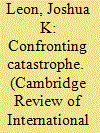| Srl | Item |
| 1 |
ID:
108253


|
|
|
|
|
| Publication |
2011.
|
| Summary/Abstract |
Social environments played a powerful role in the institutional adaptations of the AIDS fighting agencies within the United Nations system. Since its AIDS apparatus has become operational, the UN has undertaken two major strategic shifts. The first shift saw the dissolution of the GPA, a small subunit of the WHO in favour of UNAIDS, a dedicated agency engaged in global advocacy. This shift involved a controversial bureaucratic process that led, finally, to a more human rights-based approach to the disease. The second shift saw an increased emphasis on ground-level efficiency. What caused these changes? Contributions in the rationalist tradition expect the UN to act as a multilateral goal-seeker looking to optimally address a major gap in global governance. A sociological framework sees normative changes within the UN as catalysts for change in its goals and structure. A synthesis of these traditions conceptualizes the UN's strategic shifts more clearly, capturing the interactive process between the organization and its strategic environment. UN agencies were forced to rationally adapt to changing conditions in prevailing AIDS norms.
|
|
|
|
|
|
|
|
|
|
|
|
|
|
|
|
| 2 |
ID:
142210


|
|
|
|
|
| Summary/Abstract |
Interest groups partake in transnational negotiation conferences en masse. This is surprising given that the chances for influencing policymaking at these venues appear to be slim while the costs of participation are high. This amounts to an interesting question: why do so many interest groups attend transnational conferences? This article aims to answer this question by offering the first systematic study of the activities of interest groups at transnational conferences. It analyzes the goals, strategies, interactions, and influence of various types of interest groups at two transnational conferences; namely, the World Trade Organization Ministerial Conference (2011) and the Conference of the Parties of the UN Framework Convention on Climate Change (2012). The data was collected through 349 interviews with interest group representatives and 129 interviews with government delegates who participated in these conferences.
|
|
|
|
|
|
|
|
|
|
|
|
|
|
|
|